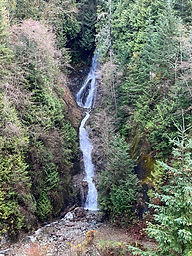The Perils of Puppy Poop
- kc dyer
- Aug 11, 2023
- 3 min read
Expert Addresses Growing Plastics Problem

Looks like Lions Bay is not the only place dog waste brings controversy. Back in March, after a resident complained to Council about the quality of bags available to stoop and scoop, former Public Works Manager Nai Jaffer addressed the issue in The Watershed. In his article, he noted that in an effort to be more environmentally conscious, Works made the change to biodegradable bags in 2020. But even with these new bags in hand, it's hard not to notice them still scattered around trails in the village.
Tony Walker, a professor at the School for Resource and Environmental Studies (SRES) in the Faculty of Science at Dalhousie University, has studied the impacts of plastic pollution for more than 30 years. He's also an avid walker and runner on the trails around Halifax, and the sight of filled and abandoned dog waste bags on all his favourite routes became too hard to ignore.
So, of course, he wrote a paper on the perils of plasticized poop.
And this man knows his er, stuff. With a group of other experts at the Roundtable on Plastics and Marine Litter, Walker helped draft the Ocean Plastics Charter for the G7 meetings in 2018. He represented Canada at the G7 Science Meeting on Plastic Pollution in Paris, France, belongs to the Scientists' Coalition for an Effective Plastics Treaty and has been an advisor to the Canadian federal government. In particular, his article on 'What Not To Do With Dog Poop' makes for fascinating reading.
Though not currently a dog owner, Walker grew up with them and has first-hand experience in dealing with their waste. "My main reason to write about this issue is my long term passion for researching solutions and policies related to reducing plastic pollution," he says. "Knowing the negative consequences of releasing biodegradable plastics into the environment, I felt compelled to write about the issue."
Even with a high percentage of conscientious dog owners, many BC trails reflect this growing problem. And, according to Walker, part of that might stem from good intentions gone wrong.

While Walker says that most new bags aimed at dog owners are labelled as biodegradable or compostable, he preaches caution. "When many brands claim to be "biodegradable" or "compostable" it really means they break down. This is true, but what's not made clear is that they often break down into microplastics. Many of these products actually contain some conventional fossil fuel-derived plastics, but are simply designed to break down faster than regular plastic bags."
Walker notes the head of waste management in Halifax and his team really dislike these types of bags, as they contaminate the compost waste stream and ultimately have to get diverted to landfill. "These products are very misleading," he adds. "If it doesn't say "100% biobased" on the package it likely contains some plastics."
Since microplastics are harmful to the environment, Walker says dog waste needs to go into municipal bins. In his paper, he notes that dog feces also contains bacteria and parasites which are harmful to both humans and the environment.
Walker explains that dog waste may contain eggs of toxocara, a parasitic worm that can cause blindness in humans, and so should only ever be composted under carefully controlled conditions. And while dog feces near fresh water can cause widespread eutrophication and algal blooms, here in Lions Bay, the biggest risk posed by dog and human waste is to the local watershed.
Walker notes that people who think packaging up the waste and tossing it back into the bushes are misguided. "Regardless of whether these dog waste bags are made of biodegradable or conventional petroleum-based plastics, they contain dog feces and do not belong in the environment," says Walker. "Both biodegradable and conventional petroleum-based plastics in the environment will persist for decades or even longer and contribute to the global plastic and microplastic pollution problem."

Lions Bay residents are free to supply their own dog waste bags. The bags provided at the dog stations scattered around the village are called 'EcoPooch', are made by a company called EcoSafe, and are manufactured here in BC.
Walker notes that even if the waste bags are biodegradable, users need to understand that these bags can only safely be composted in an industrial composting facility.
He makes a plea to all responsible pet owners, wherever they live: "Please deposit your biodegradable or conventional petroleum-based plastic dog poop bags in an appropriate waste bin, not in the environment."
Got any other puppy parables you'd care to share? Leave your comment below, or send an email to editor@lionsbaywatershed.ca


Interesting and very relevant. Thanks for this Karen!
Excellent Karen. This is an extremely important issue as this greatly affects our Lions Bay drinking water supply!